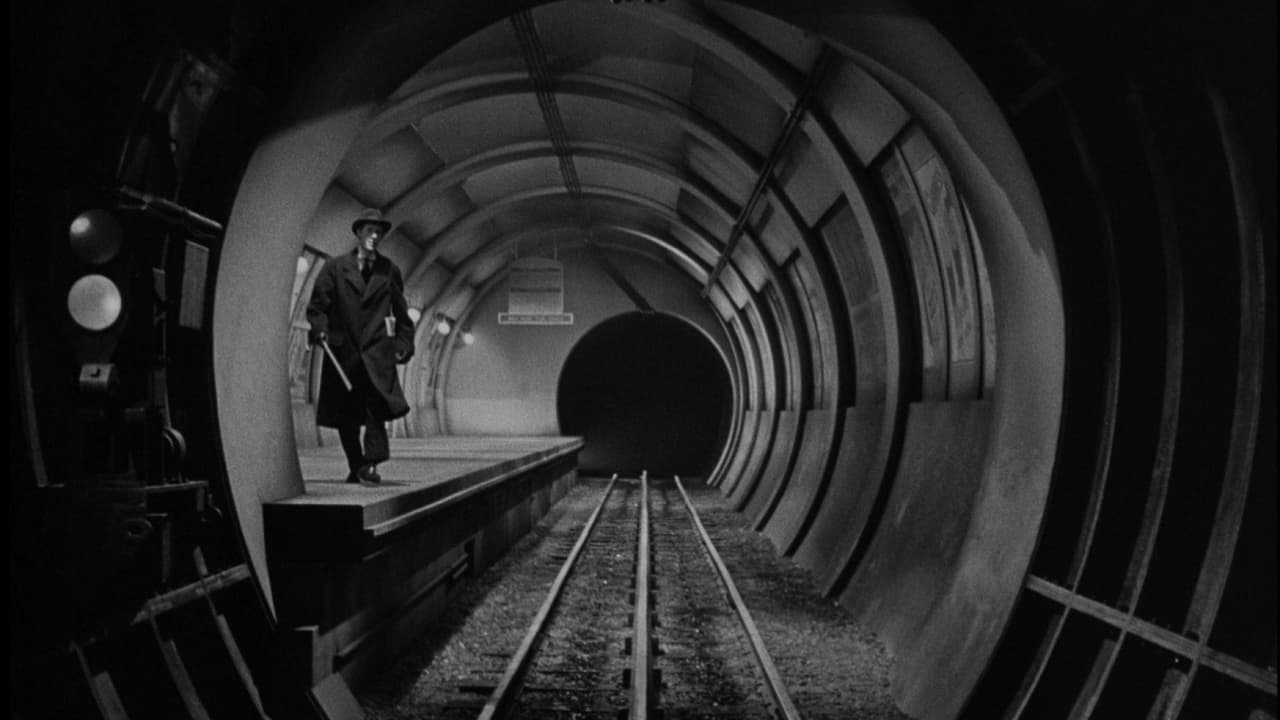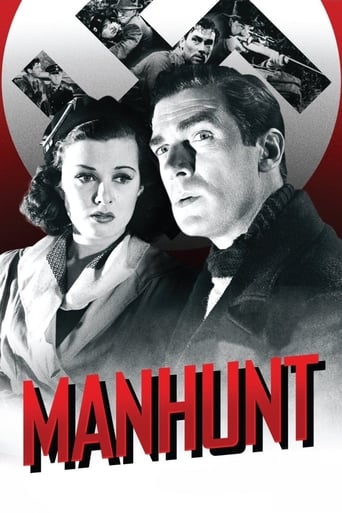ada
the leading man is my tpye
Ensofter
Overrated and overhyped
Joanna Mccarty
Amazing worth wacthing. So good. Biased but well made with many good points.
Beulah Bram
A film of deceptively outspoken contemporary relevance, this is cinema at its most alert, alarming and alive.
LeonLouisRicci
Opinions on this Fritz Lang Pre-War Film Vary a great deal. Robert Osborne, a Host on TCM and Film Historian, called it Lang's Best American Film. Wow. That is Highly Debatable, but makes the point.The Movie has many Lang Touches with some Outstanding Scenes, but the Overall Tone of the Movie is Inconsistent. The Chase Sequences and Suspense Pieces are almost Overwhelmed by the Goofy Upper Class-Street Girl Patronizing and Giddiness.Joan Bennett's Panting and Crying really Grates the Nerves and Stops the Movie's Momentum a number of times. Walter Pidgeon is Miscast but Manages what He can. George Sanders and John Carradine as Nazis are also Inconsistent, Especially Sanders.The Highlights of the Movie all come from Lang's use of Trademark Expressionism but are Ultimately Undone by Fish and Chips and Bennet's constant Begging for Thorndike's Attention. Overall, there are Enough Lang Flourishes and the Story is certainly One for the Times and Tapped into a Fantasy that Continued even After the War was Over. You know, that Hypothetical, "If You could go back in time and assassinate Hitler", etc.Not the Best American Film from Fritz Lang but a Good Entertainment with the Subject Matter, especially in the Time Frame when it was Made (Pre-War), adds to the Appeal.
happy_hangman
'Every good soldier needs a crest for his cap!'... Currently enjoying Fritz Lang's 1941 'Man Hunt'. Some very imaginative cinematography from the silent auteur, but that's only to be expected. Lang's loathing for the Nazi's is set in full flight, and the urbane George Sanders and John Carradine are gloriously oily as the baddies. Walter Pidgeon makes a rather more genial hero than Geoffrey Household's protagonist in the original story, 'Rogue Male', but it's still an amiable and engaging performance, and he works well with Joan Bennett as the working-girl (never stated explicitly, but still a surprising choice for a heroine in a 1940 film) who befriends him in adversity. Some great, tense set pieces and a great story - let down a little by the truly awful mock- Cockney accents of Bennett and many of the supporting players (most of London sounds like a Cary Grant impressionists convention). Great wee film.
funkyfry
This film wastes no time getting started -- no speeches, no anthems, no introduction. We simply see a man (Walter Pidgeon) maneuvering between Nazis in some forested region. When he finally reaches the cliff, his destination, we see him expertly assemble a scope rifle and train its cross-hairs on Der Fuhrer himself. One can just about hear the 1941 audience shouting at the screen, "Pull the trigger! Pull the trigger!" Something goes wrong, of course, and our aristocratic hero spends the rest of the film on the run from nefarious Nazis led by George Sanders and John Carradine.Pidgeon is unusually animated in this film, and there are a lot of reaction shots of him which bear a similarity to Lang's work with Spencer Tracy (they hated each other) in his American masterpiece "Fury." Carradine and Sanders are suitably nasty, a lot of fun too watch (too much fun? perhaps that's a debate for another day). Joan Bennett shows up as a prostitute who falls for Pidgeon's man on the lam, exposing herself to fatal danger in order to help him and win his heart in return. Her accent is terrible but her performance is passable.Lang handles the suspense of the chase scenes around foggy London-town with great skill and style. The only real problem that I had with the film was in a lot of the dialog between Pidgeon and Bennett; Pidgeon always has a sort of paternal edge, but in this case it is more of a patronizing razor's edge. Hilariously, Bennett bursts into tears when Pidgeon chooses the couch over her bed, and Pidgeon holds her head and calls her a "poor, dear little child", or words greatly to that effect. There are a lot of those scenes. Certainly we're missing the vital and overtly sexual Bennett of later collaborations such as the infamous "Scarlet Street." In the Lang world, Bennett must either play a saintly whore or a predatory whore, and no room in between for argument or confusion.The climax becomes a little bit weird, but the film deserves props for actually allowing the Bennett character to die. The fact that her death, as well as the torture scenes involving Pidgeon earlier in the film, are shown strictly off-screen, may represent a compromise between producer Zanuck and Joe Breen's office, which was extremely cautious about anti-Nazi propaganda prior to the official U.S. entry into WWII. This is a significant film in the development of U.S. propaganda -- recent refugee Lang wants to pull no punches, but in retrospect (or compared to his later "Hangmen Also Die") the film's treatment of Nazi villains is almost light-handed, Hollywood villain-ish.Note, by the way, how Lang manages to get Sanders' monocle and the glasses of several other German spies to gleam menacingly in the scarce lighting -- Spielberg would later use this effect in his nostalgically anti-Nazi films. Considering how much attention Lang paid to his own monocle, it's hardly an accident or a casual effect.I was interested in the scene where Bennett and Pidgeon go into a jeweler's shop to buy her a hat-pin (the fatal hat-pin, as it turns out). After entering, the distinctly Jewish-looking shopkeeper speaks to them with a heavy German accent, and Pidgeon and Bennett's characters are visibly disturbed for a moment, then continue on with the purchase. This man may have been a refugee from the Nazis, but his accent makes him momentarily suspect. I believe Lang probably included this brief bit of business as a way of expressing his own frustration with the racism that was inevitably being directed towards German émigrés during the propaganda-heavy times leading up to the conflict.
arijit-paul
The movie had all the elements which could have made it one of the greatest thriller of all time. Daring assassination attempt which could lead a continent into a war, thrilling escapades, cunning secret service agents following the trails of the wanted. Lang with his natural brilliance in this genre captivates the audience from the very first scene itself. However, unfortunately the taut suspense that the movie builds slacks through the introduction of the romantic angle in the movie. The romantic interludes slows the pace and acts as a dampener. If the screenplay could have pared these excesses of romantic interludes or could have integrated the same in a better way with the main narration of the film, this film could have become, as I said in the beginning, one of the greatest thrillers of all time.

